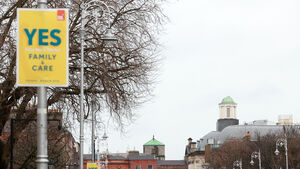New wording in Constitution won't be much help to beleaguered carers

Fine Gael posters in Dublin campaigning for Yes vote in the upcoming referendum. Picture: Sam Boal/Collins Photos
On March 8th next, which is International Women's Day, Ireland will vote on whether to amend the "woman in the home" clause in Bunreacht na hÉireann. This referendum represents the latest milestone in our country's gradual evolution away from traditional mores concerning gender roles. Irish society, reflecting the European model, continues to move towards more progressive, egalitarian norms.
The 1937 constitution's controversial Article 41.2 specifies that "by her life within the home, woman gives to the State a support without which the common good cannot be achieved". It asks the State to ensure that mothers are not "obliged by economic necessity to engage in labour to the neglect of their duties in the home".
There is much hand-wringing and breast-beating among apologists, but comprehending this clause requires understanding the context from which it emerged. In the 1930s, Ireland remained profoundly influenced by Catholicism, which permeated all facets of Irish life. The Church exercised enormous authority over Ireland's moral, social and political affairs.
Catholicism, at least in doctrinal principle, venerates the sanctity of motherhood and values women as nurturers devoted to raising children.
Stay-at-home mothers in the Ireland of 1937 were regarded as fulfilling God's will by selflessly dedicating themselves to familial caregiving. Irish society expected women to embrace maternal roles within domestic domains rather than competing against men in masculine realms of employment or governance.
Éamon de Valera led the drafting of Ireland's conservative Catholic-inspired constitution in consultation with senior clergymen. His vision aligned with Catholic teachings that wives should be subordinate helpmates to their husbands, managing households and children. However archaic such notions appear to our modern sensibilities, Ireland was not a cultural outlier in this regard.
The Constitution's clause concerning women's place in the home aimed to honour their significance as mothers and wives while ostensibly directing the State to support them financially so they would not be forced by poverty into the workplace. Given the ubiquity of Catholic influences, most Irish people in that era accepted this traditional arrangement as the natural, proper order.
However, in practice, in a male-dominated political culture, Ireland failed to deliver on the Constitution's promise to provide for women, enabling them to fulfil domestic duties full-time. The State gave mothers no allowances, childcare, tax credits, pensions, or protections. Despite Article 41.2's declaratory veneration of stay-at-home motherhood, successive Irish governments disregarded associated obligations to provide for women who eschewed employment for child-rearing. We bowed in deference to the ideal but shied away from the mundane details of women's lives.
The clause merely paid lip service to cherishing mothers in the home without backing it up substantially. Ensuring women remained dependent housewives appeared less important to officials than upholding the outward appearance of valuing their domestic contributions. In this respect, the State mirrored the misogyny of the Irish Church, never allowing their aspirational morals to interfere with financial realities.

Over subsequent decades, as Ireland slowly modernised, this contradiction between mythologising motherhood and marginalising motherhood in all its expressions became increasingly glaring and indefensible. Mothers worked because economic realities required it, regardless of constitutional platitudes.
During the 20th century, Ireland experienced rising female participation in third-level education, public sector employment, and the workplace generally. Entry into the EEC in 1973 challenged assumptions about women's roles, as European anti-discrimination employment laws pressured Ireland to dismantle barriers for working women. The era of cold male dominance in the upper echelons of Irish society is happily at an end.
The women's liberation movement, access to contraception, and evolving social attitudes provided alternatives to the dominance of traditional teachings on womanhood. By the 1990s, Ireland's stay-at-home housewife ideal was already anachronistic. By the Celtic Tiger years, it seemed positively medieval.
Yet this constitutional clause praising women's domesticity endures. For 21st-century Ireland, the language appears jarringly outdated, even if it reflected mainstream attitudes when drafted 85 years ago. Contemporary Ireland bears little resemblance to de Valera's mid-20th century idyll, but have we truly changed in practice, and is the proposed amendment a hollow act of political virtue signalling?
For some older citizens, residual conservatism or nostalgia for tradition may stoke resistance to amending language that resonates with beloved national mythologies concerning Irish mothers. While paternalistic and sexist to modern ears, the sentiments reflect genuine esteem for mothers in their era.
This referendum asks voters if Ireland should completely abandon vestiges of that bygone culture that, at least in appearance, venerated women's maternal roles. The replacement wording utilises inclusive, gender-neutral terms acknowledging diverse family and caregiving arrangements. Rather than imposing external expectations on women, it emphasises recognising individuals' choices and valuing their contributions, whether in homes or workplaces.
The revised text, proposed by an all-party Oireachtas committee, reads:
"The State recognises that the provision of care, by members of a family to one another by reason of the bonds that exist among them, gives to Society a support without which the common good cannot be achieved, and shall strive to support such provision."
This wording represents a definite change on paper, removing archaic gender stereotypes from Ireland's legal framework. It conveys respect for caregiving without limiting it to traditional motherhood. This revision aligns better with the realities of modern Ireland, reflecting European mores.
The sad truth is that little has changed - the new wording remains largely aspirational and toothless. While compelling in rhetoric, it doesn't legally compel the State to do anything substantive to support caregivers. Like the current clause, it placates carers with empty platitudes rather than entitlements or benefits. de Valera can turn comfortably in his grave.
The more substantial recommendations of the Citizens Assembly, containing enforceable requirements on the State to support all caregivers reasonably, were regrettably diluted. So once again, the Irish Government seems set to codify lofty words over meaningful action, preening in the spotlight of self-congratulatory progressivism. Lights, camera, no action.
So this referendum may remove the sexist language, but once again fails to ensure carers - paid or unpaid, male or female - receive the state assistance their undervalued service deserves. It swaps meaningless words for more pointless words. It's another tried and tested exercise in political window dressing. The tireless labours of Ireland's overlooked carers will remain largely unacknowledged and unsupported. Hopefully, on March 8th, they can park their care duties and let their ire be felt by casting their votes. The referendum will hint at the lie of political sentiment months before the 2024 general election.
The optics of holding what is an Irish constitutional referendum on International Women's Day speaks volumes about our Government's penchant for virtue signalling by association with an international audience. Our constitution, the bedrock of an independent state, should not be subject to change as political window dressing. It's a statement of the moral backbone of the State, not to be amended in a cynical PR exercise to appease foreign climes.
Nonetheless, eliminating the notion that women inherently belong in kitchens is unquestionably progressive, and no law should define a woman's place, duties, or supposed virtues. Irish mothers are no longer meekly obedient to a male-dominated political, professional and clerical hierarchy; they are doctors, executives, scientists, and politicians.
Ireland cannot build an equitable, opportunity-rich society while clinging to outdated stereotypes, so even symbolic victories matter. Although this referendum does little legally, it cleans away the cobwebs of discrimination.
By March 9th, Ireland's constitution might no longer declare that a woman's rightful place is primarily in the home because the citizens deem it proper. Irish women can finally abandon those moth-eaten bloomers for good.




